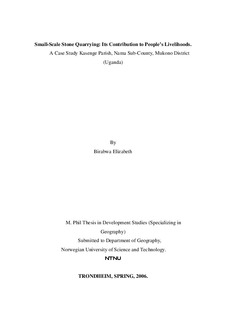Small-Scale Stone Quarrying: Its Contribution to People's Livelihoods.: A Case Study Kasenge Parish, Nama Sub-County, Mukono District (Uganda)
Master thesis
Permanent lenke
http://hdl.handle.net/11250/265262Utgivelsesdato
2006Metadata
Vis full innførselSamlinger
- Institutt for geografi [1108]
Sammendrag
With majority of the world’s poor living in rural areas and engaging in agriculture governments and NGOs have taken measures to promote agricultural activities so as to alleviate poverty. Uganda’s Poverty Eradication Action Plan (PEAP) which serves as the government’s main development intervention to reduce poverty acknowledges agriculture as one of the strategies aimed to increase income levels of the poor. Provisions of agricultural advisory services in addition to establishment of agricultural research centers amongst others; are some of the initiatives put in place by the government. However in spite of the all these efforts, there is concern about the growing non-agricultural informal activities as alternative sources of income in Uganda, a country with high agricultural potential. It is in this context therefore, that this research study seeks to find out why individuals and rural households in Kasenge Parish, Mukono district engage in small scale stone extraction. This study also seeks to identify the constraints and the vulnerabilities associated with small scale quarrying activities and further assess the effects of laws, policies and institutions in enhancing or hindering these activities. This research study also endeavors to explore the different livelihood outcomes realized by the stone workers and Kasenge parish as a result of stone quarrying activities. The study relies on information collected qualitatively through individual and group interviews coupled with personal observations in addition to documented data from published and unpublished articles. Based on the Sustainable Livelihoods Approach and the Sustainable Livelihoods Framework, findings revealed that small scale stone quarrying was both a poverty and market driven activity; that was enhanced by political stability and rural-urban population increase. Informal stone extraction however, was prone to human and economic shocks that affect the workers, quarrying activities and the outcomes as well. The findings further showed that small scale quarrying activities are not affected by the law that governs mineral extraction. In fact the Mineral Policy enhances small scale mining for national, socio-economic development. However, women at Kasenge are constrained by gender roles and informal regulations. The livelihood outcomes realized were both tangible and non-tangible to the workers and the Kasenge community. In view of this, the study recommends official recognition of small scale quarrying so as to enhance sustainable development in harvesting of a non-renewable natural resource. Key words: Small Scale Mineral Extraction, Sustainable Livelihoods
